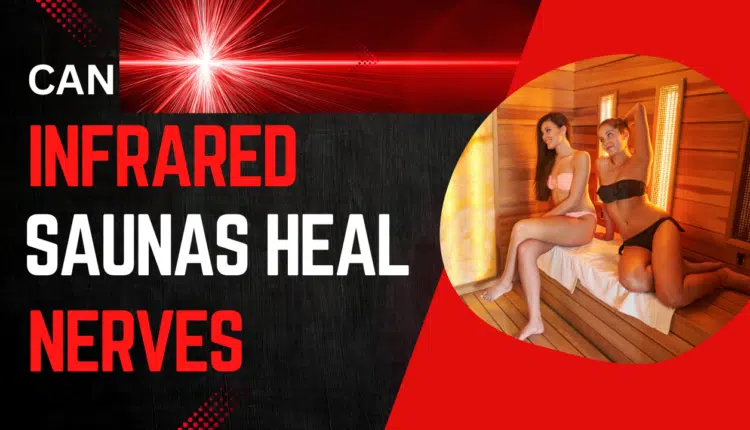Infrared Saunas and Nerve Pain: Do They Actually Work?
Infrared saunas are celebrated for their relaxing sessions and health benefits, but can they help with nerve health? This article explores how infrared saunas support nerve-related conditions like neuropathy, their limitations, and why photobiomodulation (PBM) is a better choice for nerve regeneration.
What Are Infrared Saunas?
Unlike traditional steam saunas, infrared saunas use infrared light to heat the body directly, penetrating muscles, joints, and tissues. Popularized in the 1970s after NASA’s research for astronaut health, they’re now mainstream for promoting relaxation and improving circulation. Their gentle heat offers a comfortable alternative to high-temperature saunas.
How Infrared Saunas Benefit Nerve Health
Infrared saunas provide several benefits that indirectly support nerve health, primarily through pain relief and systemic improvements.
Improved Circulation
Infrared heat dilates blood vessels, enhancing blood flow. This delivers oxygen and nutrients to tissues, supporting cellular repair and easing nerve discomfort. For neuropathy patients, better circulation can reduce tingling and numbness.
Detoxification via Sweating
Far-infrared saunas induce 3-7 times more sweating than traditional saunas, boosting lymphatic flow and eliminating toxins from fat cells. This detox process reduces nerve stress and supports recovery.
Pain and Inflammation Relief
Increased circulation flushes out inflammatory byproducts like lactic acid, reducing swelling and pain.
Far-infrared therapy also increases superoxide dismutase (SOD), an antioxidant protecting nerve cells. Studies show reduced levels of pro-inflammatory cytokines, including:
- Tumor necrosis factor-alpha (TNF-α)
- Interleukin-6 (IL-6)
- C-reactive protein (CRP)
These cytokines are linked to chronic pain conditions like fibromyalgia and nerve inflammation.
Endorphin and Neurotransmitter Boost
Infrared heat triggers endorphin release, acting as natural painkillers to block nerve pain signals. It also boosts serotonin, dopamine, and oxytocin, improving mood and reducing stress. Lower cortisol levels further decrease inflammation and pain.
Muscle Relaxation
By heating tissues internally, infrared saunas reduce muscle tension and improve elasticity. This prevents nerve compression from tight muscles, easing pain and enhancing mobility.
Reduced Nerve Sensitivity
Lowering pro-inflammatory cytokines decreases nerve sensitivity, slowing pain signals to the brain and reducing perceived discomfort.
Why Infrared Saunas Can’t Regenerate Nerves
While infrared saunas excel in symptom relief, they don’t directly repair nerve damage due to several limitations.
Ineffective Wavelengths
Infrared saunas operate at 3,000–100,000 nm, designed for heating and sweating, not cellular repair. Nerve regeneration requires 800–1,100 nm wavelengths to stimulate mitochondria.
Insufficient Energy
Nerve repair needs 5–10 joules/cm² of energy. Infrared saunas disperse energy broadly, diluting its impact on specific tissues.
No Mitochondrial Repair
Infrared saunas don’t activate cytochrome c oxidase, a mitochondrial enzyme essential for nerve regeneration, limiting their repair capabilities.
Lack of Skin Contact
Effective nerve repair requires light applied close to the skin. In saunas, the light source is distant, reducing penetration and intensity.
Photobiomodulation (PBM): The Nerve Repair Solution
Photobiomodulation (PBM) uses near-infrared light (800–1,100 nm) to stimulate cellular repair and regenerate nerves. Unlike infrared saunas, PBM offers:
- Optimal Wavelengths: Targets nerve regeneration in the peripheral nervous system, spinal cord, and brain.
- Mitochondrial Stimulation: Activates cytochrome c oxidase, boosting ATP for nerve repair.
- Therapeutic Energy: Delivers 5–10 joules/cm² directly to tissues.
- Direct Skin Application: Ensures deep penetration and energy absorption.
Backed by researchers like Dr. Michael Hamblin, PBM is noninvasive and effective for nerve regeneration.
Infrared Sauna vs PBM: A Comparison
|
Feature
|
Infrared Sauna | Photobiomodulation (PBM) |
| Wavelength | 3,000-100,000 nm | 800-1,100 nm |
| Nerve Benefit | Pain relief, circulation | Nerve regeneration, repair |
| Energy Delivery | Dispersed, low intensity | Targeted, 5-10 joules/cm2 |
| Mitochondrial Repair | No | yes |
| Skin Contact | No | Yes |
Infrared saunas are great for symptom management, but PBM is superior for nerve repair.
FAQs About Infrared Saunas and Nerve Health
Can infrared saunas relieve neuropathy symptoms
Yes, they reduce pain and inflammation by improving circulation and lowering cytokines, but they don’t repair nerves.
How often should I use an infrared sauna for nerve pain?
2–3 sessions per week (20–30 minutes) can help. Consult a doctor for tailored advice.
Is PBM safe for nerve repair?
PBM is safe and noninvasive when used with medical-grade devices under professional supervision.
Struggling with Neuropathy?
Dr. Coppola and Dr. Monteiro’s dedication to combating neuropathy is deeply personal, stemming from Dr. Monteiro’s experience with her mother’s severe chemo-induced neuropathy. This personal journey fueled their commitment to develop a systematic, drug-free approach to reversing neuropathy.
They founded the San Antonio Neuropathy Center, where they’ve successfully treated over 18,000 patients over the past two decades. Their acclaimed book, “Defeat Neuropathy Now in Spite of Your Doctor,” along with their neuropathy product line, stands as a testament to their expertise and innovative solutions.
Recognized as leading neuropathy specialists in America, Dr. Coppola and Dr. Monteiro offer a beacon of hope for those diagnosed with this challenging condition. If you or a loved one is seeking relief from neuropathy, reach out to us at 844 400-0101 or email us through our contact page – Click here.
Your path to healing can start today.


Comments are closed, but trackbacks and pingbacks are open.